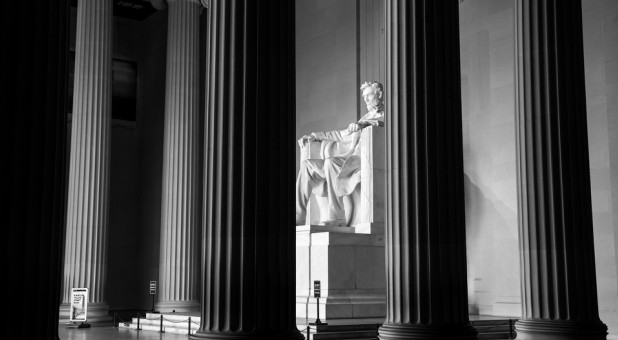What President Lincoln Asked Us to Do On Thursday
This coming Thursday, May 3, 2018, will be the National Day of Prayer. The theme for this year is: Pray for America—Unity, based on Ephesians 4:3, where St. Paul urges everyone to, “Make it your aim to be at one in the Spirit, and you will inevitably be at peace with one another” (PHILLIPS).
It seems a long time since the United States of America was really united about anything. Was it simply a good idea that on April 17, 1952, President Harry Truman signed a bill proclaiming the National Day of Prayer into law in the United States? Was it just a rare moment of unity when Congress unanimously passed a bill that President Reagan signed in 1988, designating the first Thursday of May each year as the National Day of Prayer?
There was another time in the history of our country that the United States was anything but united. The civil war was raging into its third year with no end of the war in sight. Senator James Harlan of Iowa, whose daughter later married President Lincoln’s son Robert, introduced a resolution in the Senate on March 2, 1863. The resolution asked President Lincoln to proclaim a National Day of Prayer and Fasting. The resolution was adopted on March 3, and signed by Lincoln on March 30, one month before the prayer and fast day was observed.
President Lincoln was famously quoted as saying, “I have been driven many times upon my knees by the overwhelming conviction that I had nowhere else to go. My own wisdom and that of all about me seemed insufficient for that day.”
And, in the midst of the Civil War, Abraham Lincoln was purportedly asked if God was on his side. The President replied, “Sir, my concern is not whether God is on our side. My greatest concern is to be on God’s side, for God is always right.”
So, perhaps we should not be surprised that our 16th president was more than willing to sign a proclamation for a National Day of Prayer and Fasting that hearkens back to one of the great Old Testament kings, King Jehoshaphat, who also called Judah to perhaps the first National Day of Prayer and Fasting when “a great multitude” from Moab was on the warpath to attack Judah. “Then Jehoshaphat was fearful and set himself to seek the Lord, and he called for a fast throughout all Judah” (2 Chron. 20:3).
As James Michener said in Centennial, “We cannot choose the times we live in, we can only make them better by the lives we live.” Indeed. Whether or not Almighty God had allowed us to live in Old Testament times, Civil War Times or in 2018, we have the same God who is still calling us to our knees to pray for unity in a divided country, to pray for a president who, like Queen Esther, was chosen “for such a time as this” (Esther 4:14c), and to pray for “our families, friends, and neighbors, and for those are alone” (The Book of Common Prayer).
Let us take to heart these closing words of Lincoln’s proclamation and remember this National Day of Prayer to do what President George W. Bush once suggested to then Governor of Nebraska Mike Johanns: “Just pray”.
By the president: Abraham Lincoln
Now, therefore, in compliance with the request, and fully concurring in the views of the Senate, I do, by this my proclamation, designate and set apart Thursday, the 30th. day of April, 1863, as a day of national humiliation, fasting and prayer. And I do hereby request all the People to abstain, on that day, from their ordinary secular pursuits, and to unite, at their several places of public worship and their respective homes, in keeping the day holy to the Lord, and devoted to the humble discharge of the religious duties proper to that solemn occasion.
All this being done, in sincerity and truth, let us then rest humbly in the hope authorized by the Divine teachings, that the united cry of the Nation will be heard on high, and answered with blessings, no less than the pardon of our national sins, and the restoration of our now divided and suffering Country, to its former happy condition of unity and peace.
Ed Nilson attended Gordon-Conwell and Princeton Theological Seminaries. He isa graduate of the University of Missouri School of Law. He enjoys leading church services and serving the homeless and forgotten at soup kitchens and prisons.
{eoa}











